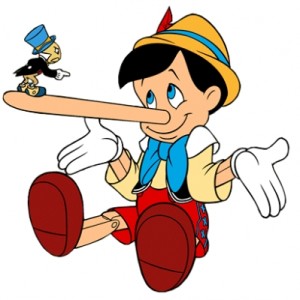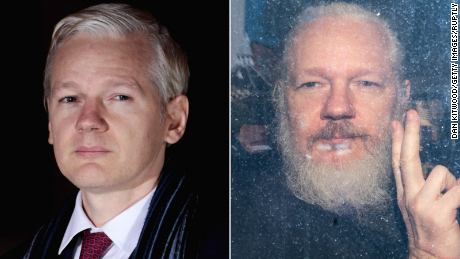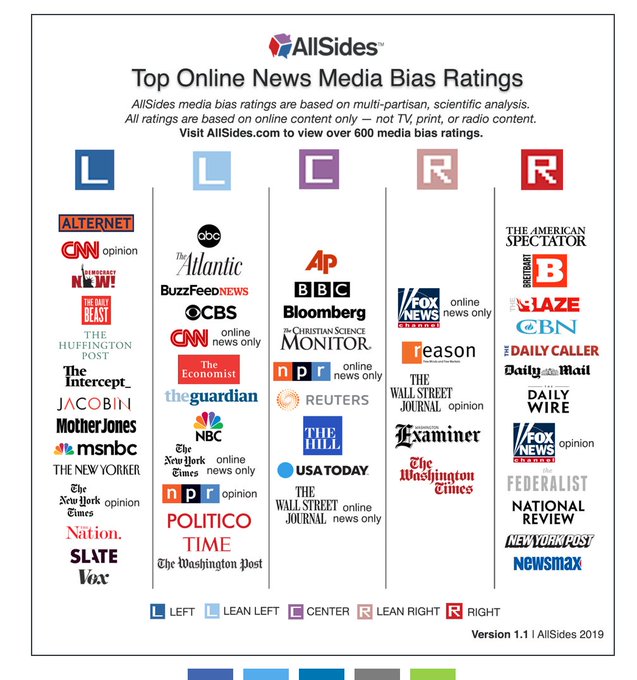
Pinocchio and Jiminy Cricket, provided by Seth Borenstein from scriptsandscriptors.wordpress.com.
By Eric Anderson
The reason fake news exists is not complicated. The majority of journalists don’t follow a professional ethical code. It’s not that they don’t have an ethical code. It’s that they – or more likely their paymasters — don’t want to be held accountable for breaking it.
Four basic elements comprise the Society of Professional Journalism’s (SPJ) voluntary code of ethics: (1) seek truth and report it; (2) minimize harm; (3) act independently, and; (4) be accountable. But because there aren’t any penalties for not following the code, journalists are perfectly free to: (1) report lies; (2) maximize harm inflicted upon their paymasters enemies, for; (3) a corporate paycheck upon which they are absolutely dependent, and; (4) be left completely unaccountable for the damage done to society. What? You didn’t swoon?
Of course you didn’t. Because, the public already knows this to be the norm practiced by the large majority of “professional” journalists today — as demonstrated by the 2017 Gallup/Knight Foundation Survey on Trust, Media, and Democracy. The survey found that an overwhelming majority of Americans (84 percent) believe it is harder to be well informed and to determine which news is accurate. The same percentage also increasingly perceives journalists to be biased and they struggle to identify objective news sources. And again, hold on to the table: The survey concludes that “[a]mid the changing informational landscape, media trust in the U.S. has been eroding, making it harder for the news media to fulfill their democratic responsibilities of informing the public and holding government leaders accountable.”
Given such a trenchant indictment, and amid the obviously changing informational landscape, one might think the SPJ would be inclined toward some out-of-the-box thinking in an effort to address this catastrophic lack of public trust. Wrong! Just witness the puerile arguments regarding the reasons the SPJ doesn’t enforce their Code of Ethics:
• The SPJ thinks that encouraging fellow journalists and the public to hold news reports and commentary up to ethical scrutiny is the most effective antidote to questionable reporting — not quasi-judicial proceedings;
• And that establishing a quasi-judicial system, such as those found among other professions, would inevitably lead to actions by governments, thereby restricting protected speech;
• And that protected speech is vulnerable and placed in jeopardy whenever it’s allowed to be confused with, or limited by, the professional responsibility to act ethically;
• And that professional enforcement of ethics for news reporting would require more detailed provisions and case law that are far beyond their resources to provide, even if desirable, because no set of rules, however detailed, could possibly apply to all the nuances and ambiguities of legitimate expression;
These are nothing more than excuses as to why the SPJ advocates no action be taken to reform journalism in the modern age. Which begs the question: What action has the SPJ taken?
Well, it seems the SPJ has “entered into a partnership with Bloomberg to teach ethics to professionals.” Fox? Meet henhouse.
And, given that the hens are allowing the fox to rule the roost, it would be remiss to not ask another question: Can we really, in good faith, allow journalists to call themselves professionals?
I’m pretty sure the noted sociologist Eliot Freidson would not. Freidson posited five elements that define a professional:
(1) Adherence to an ideology that asserts a greater commitment to doing good work than to economic gain and to the quality rather than the economic efficiency of work
(2) Performs specialized work grounded in a body of theoretically-based, discretionary knowledge and skill that is accordingly given special status
(3) Possesses exclusive jurisdiction in a particular division of labor created and controlled by occupational negotiation
(4) Occupies a sheltered position that is based on qualifying credentials created by the occupation
(5) Has completed a formal training program that produces qualifying credentials, which are controlled by the occupation and associated with higher education
With good reason, all five factors apply to what are traditionally called the “white collar professions.” Because when doctors lie, people die — witness the opioid epidemic. When lawyers lie, people die. Don’t believe me? Do a quick web search of “dishonest prosecutor death penalty.” When engineers lie, people die –witness Boeing. In short, when professionals that broker in public trust tell lies, people needlessly die — witness Judith Miller. And witness, too, the utter lack of accountability that followed her comeback.
Fortunately, the factors outlined above also contain the cure to the changing informational landscape’s problem with fake news. Journalists can create sheltered positions that are based on qualifying credentials created by the occupation, combined with a formal training program that produces qualifying credentials that are controlled by the occupation and associated with higher education. Which, in turn, would result in truly professional journalists that assert greater commitment to doing good work than to economic gain, and to the quality rather than the economic efficiency of their work.
And hear the SPJ protest: Requiring the establishment of a quasi-judicial system, such as those found among other professions, would inevitably lead to actions by governments, thereby restricting protected speech! It might. But it doesn’t have to.
Coming full circle, we arrive back at the point where the SPJ has utterly failed to think outside the box.
Licensure does not need to be required in order to be effective. It can be voluntary, because the U.S. Constitution also enshrines another fundamental right – the right to enter into and be bound by contract. Just think, for a moment, the profound trust that would be instilled among the public for the journalists who were willing to put their necks on the line – for the truth.
Thus, the answer to the fake news problem can be solved as easily as it was created. A few brave and principled journalists just need to form a new organization that allows them to submit to licensing requirements, wherein their peers can sanction and revoke licensure like every other “professional” organization in the US that brokers in public trust. And for that, one can only hope their efforts will be applauded and secured throughout the remaining history of what once was, and still can be, a noble profession.
Until that time, journalism deserves every ounce of shame thrown upon its practice.




